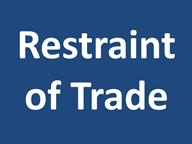Writing an employment contract? In this special article, a guest expert takes a look at the concept of employment restraint of trade.
George Haros is a highly experienced workplace lawyer and today he is answering some tricky employment contract questions:
- What is a restraint of trade clause?
- What should we make of the Emeco v O’Shea case?
- Will your restraint of trade clause be enforced?
- What you can do to get it right?
[box type=”alert”]
FREE LEGAL BRIEFINGS:
See available session times here: Free Workplace Law Briefings For Employers [/box]
Over to George . . .
What is an employment restraint of trade clause?
An employment restraint of trade clause is commonly found in an employment agreement and used by employers in an attempt to protect the employer’s business interests.
 Why is a restraint of trade clause important?
Why is a restraint of trade clause important?
A restraint of trade clause attempts to regulate an employee’s conduct while still engaged in the employment relationship or a former employee’s conduct once the employment relationship has ended.
However, employers must also take extreme care when considering the inclusion of such restraint clauses.
Where the clauses are ambiguous or too broad, a court may find the restraint unenforceable.
The main principle is that the restraint can only be upheld if it protects the legitimate interests of the employer, and the clause is not wider than is reasonably necessary to protect those interests.
Although there is no precise rule as to what restraint terms are considered reasonable; what is required in each case is an evaluative judgement taking into account the specific circumstances of each party and their relationship.
The Emeco v O’Shea Case
The recent case of Emeco v O’Shea [2012] WASC 348 demonstrates how the Courts of Western Australia have considered restraint clauses.
Emeco v O’Shea [2012] WASC 348 Facts: Emeco operated in the highly competitive industry of dry hiring mobile mining equipment in Australia and internationally.
Mr O’Shea was employed by Emeco as a business development manager for 21 months.
As a senior employee, he built up close relationships with important clients of Emeco and was entrusted with confidential information.
After Mr O’Shea resigned from Emeco, he immediately took up employment with one of Emeco’s major competitors, National Plant and Equipment (NPE). Emeco sought an injunction to enforce the restraints in Mr O’Shea’s employment contract, amongst which he would be prevented from working for Emeco’s competitors, soliciting any of its clients, or providing services to any of its clients within Western Australia, for a period of 6 months after the termination of employment.
The Decision: Endelman J accepted that Emeco’s legitimate interests included its customer connections and confidential information, and Emeco was entitled to restrain its employees to the extent necessary to protect its legitimate interests.
The Court found that in Mr O’Shea’s role as a business development manager at Emeco, he retained confidential information about the business and its individual clients, which could be used to the detriment of Emeco.
[box type=”alert”]
FREE WORKPLACE LAW ONLINE BRIEFINGS:
See available session times here: Free Workplace Law Briefings For Employers [/box]
On that basis, the Court held that it was reasonable for Emeco to restrain Mr O’Shea from undertaking employment with any competitor, including NPE, for a period of 6 months. However, the non-solicitation and client restraints were found to be unenforceable due mainly to the broad definition of “client”, which covered both actual and potential customers of Emeco, and were not limited to those with whom Mr O’Shea had personal contact.
The Court was therefore of the opinion that these restraints could go further than was reasonable to protect the legitimate interests of Emeco in protecting those customer connections developed by the employee. As a part of its judgment, the Court also considered the fact that the restraint clauses were subject to the express qualification that Mr O’Shea will not engage in the restrained activities “without the prior written consent of Emeco”.
This qualification implies that Emeco would not unreasonably withhold consent, and was a factor that played some part in the Court’s determination that the competitor restraint was reasonable. However, the Court also noted that such qualification could not operate to make a very wide restraint clause enforceable.
Will your restraint of trade clause be enforced?
Based on the case law in this area it is clear that whether or not your clause will be enforceable will depend on the construction of the restraint clause and of course, the circumstances.
The onus is on the employer to prove that the restraint clause is valid and enforceable where a business can demonstrate that it has a legitimate interest to protect and that the clause is reasonable.
What you can do to get it right?
Consider:
- Is there a genuine and legitimate interest that needs protecting?
- Is your restraint clause for a time period that is longer than necessary to protect that interest?
- Does the restraint clause cover a geographical area that is larger than necessary to protect that interest?
- Take particular care to ensure that the restraint is not so broad as to prevent the employee from working at all; and For Employers, seek advice on the construction of your clause.
[box type=”alert”]
FREE WORKPLACE LAW ONLINE BRIEFINGS:
See available session times here: Free Workplace Law Briefings For Employers [/box]
Thanks to George for this excellent information.
HRwisdom